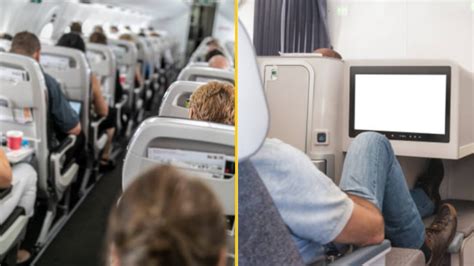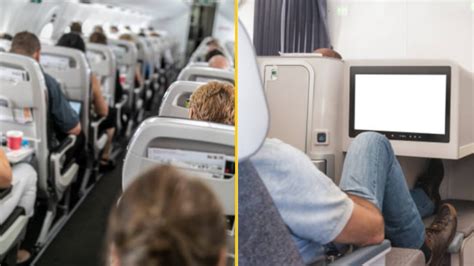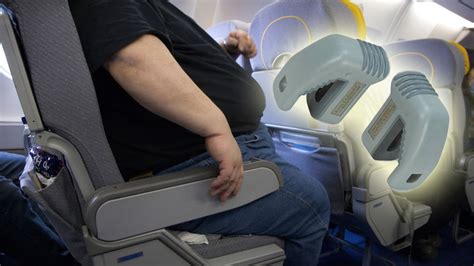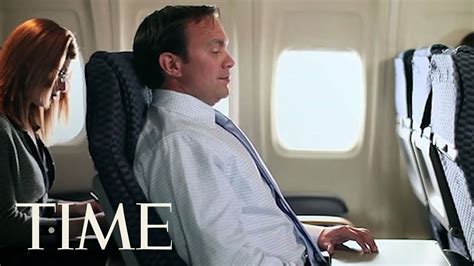
Airline passengers who aggressively recline their seats may soon face financial penalties, as a new regulation aims to curb disruptive in-flight behavior and enhance passenger comfort.
Aggressive seat reclining on airplanes, often cited as a major source of passenger disputes, has prompted authorities to implement stricter guidelines, potentially leading to fines for those who disregard fellow travelers’ personal space and comfort. The move comes amid increasing complaints and incidents of air rage related to seat reclining etiquette. While specific details on the enforcement mechanisms and fine amounts are still emerging, the new policy underscores a growing effort to create a more respectful and comfortable flying environment.
The debate around seat reclining has long been a contentious issue among airline passengers. Some argue they have the right to recline their seats, citing the feature as part of the ticket they purchased. Others contend that reclining can severely limit the legroom of the passenger behind, causing discomfort and sometimes leading to confrontations.
“The act of reclining a seat has become a flashpoint on many flights, turning what should be a relaxing experience into a battle for personal space,” explains travel expert Sarah Miller. “Airlines are now under pressure to find a solution that balances the rights of all passengers.”
The new regulation is expected to provide a framework for flight attendants to address seat reclining disputes more effectively. In the past, flight attendants have often been left to mediate these situations without clear guidelines, leading to inconsistent outcomes. The prospect of fines may serve as a deterrent, encouraging passengers to be more considerate of those seated behind them.
Details on the specific behaviors that would trigger a fine are still being clarified. However, it is likely that aggressive or excessive reclining, especially after a warning from a flight attendant, would be grounds for a penalty. Some airlines might also establish specific times during the flight when reclining is prohibited, such as during meal service.
The International Air Transport Association (IATA) has been consulted on the matter to potentially standardize guidelines across different airlines. This would help ensure consistency and clarity for passengers, regardless of the airline they are flying with.
“We are exploring various options to promote harmonious travel,” stated an IATA spokesperson. “This includes considering best practices for seat reclining that respect the comfort of all passengers.”
The introduction of potential fines has sparked mixed reactions from passengers. Some welcome the move as a necessary step to curb inconsiderate behavior, while others view it as an overreach that infringes on their rights as paying customers.
“I think it’s a great idea,” said frequent flyer John Thompson. “I’ve been stuck behind people who slam their seats back without warning, crushing my knees. A fine might make them think twice.”
However, others are less enthusiastic. “I paid for my seat, and I should be able to use the features it offers,” argued passenger Maria Rodriguez. “If there’s not enough legroom, that’s the airline’s fault, not mine.”
Airlines are also considering alternative solutions to the seat reclining problem. Some are exploring the possibility of redesigning seats to provide more legroom or limit the recline angle. Others are investing in technology that allows passengers to communicate their preferences to each other, such as a system that alerts the passenger in front when the passenger behind needs more space.
“Ultimately, the goal is to find a solution that respects the needs of all passengers and minimizes conflict,” said airline industry analyst David Lee. “Whether that involves fines, redesigned seats, or improved communication, the industry is committed to finding a way forward.”
The implementation of fines for aggressive seat reclining marks a significant shift in how airlines address passenger disputes. It reflects a growing recognition that inconsiderate behavior can disrupt the flying experience and create an uncomfortable environment for everyone on board.
Further details on the enforcement of these fines, the specific behaviors that will trigger them, and the appeals process are expected to be released in the coming weeks. Passengers are advised to check with their airline for the most up-to-date information on seat reclining policies and potential penalties.
The effectiveness of these fines remains to be seen. However, the move signals a clear message that airlines are taking passenger comfort seriously and are willing to take action to address disruptive behavior. This could lead to a more respectful and enjoyable flying experience for all.
Impact on Flight Attendants and Crew
The new regulation is expected to significantly impact the role of flight attendants. Previously, they often had to mediate disputes over reclining seats without clear guidelines or authority. The introduction of fines provides them with a tangible tool to enforce passenger etiquette. This increased authority could potentially reduce the stress and burden on flight attendants, allowing them to focus on other aspects of passenger safety and service.
Flight attendants will likely undergo additional training to properly assess and address reclining-related incidents. This training will likely cover techniques for de-escalating conflicts, identifying aggressive behavior, and documenting incidents accurately. The goal is to equip flight attendants with the skills and knowledge necessary to enforce the new regulation fairly and effectively.
However, there are also concerns about the potential for increased conflict between passengers and flight attendants. Some passengers may resent being reprimanded or fined for reclining their seats, leading to confrontations with the crew. Airlines will need to provide clear guidelines and support to flight attendants to help them navigate these potentially challenging situations.
Moreover, the burden of proof in determining whether a passenger’s reclining behavior warrants a fine could fall on the flight attendants. This could require them to gather evidence, such as witness statements or video footage, to support their decision. Airlines will need to invest in technology and resources to facilitate this process and ensure that fines are issued fairly and consistently.
The Role of Technology and Seat Design
The debate over seat reclining has also spurred innovation in seat design and in-flight technology. Several companies are developing new seating configurations that aim to maximize legroom and minimize the impact of reclining on other passengers. These designs often involve staggered seating arrangements or seats that slide forward instead of reclining backward.
Some airlines are experimenting with “slimline” seats, which are thinner and lighter than traditional seats. While these seats can increase the overall capacity of the aircraft, they often provide less padding and support, leading to discomfort for some passengers.
Another technological solution involves using sensors to detect when a passenger’s knees are being impacted by a reclined seat. This information could be used to automatically adjust the recline angle or alert the passenger in front to the discomfort of the passenger behind.
Airlines are also exploring the use of in-flight entertainment systems to provide passengers with more control over their personal space. Some systems allow passengers to communicate directly with each other, such as requesting the passenger in front to adjust their seat. Others provide noise-canceling headphones to minimize the impact of disruptive behavior.
These technological advancements offer the potential to mitigate the negative effects of seat reclining and create a more comfortable flying experience for all passengers. However, the cost and feasibility of implementing these solutions remain a challenge for many airlines.
Legal and Ethical Considerations
The introduction of fines for aggressive seat reclining raises several legal and ethical considerations. One key issue is the fairness and consistency of enforcement. Airlines will need to develop clear and objective criteria for determining when a passenger’s behavior warrants a fine. This will help prevent arbitrary or discriminatory enforcement.
Another concern is the potential for legal challenges to the fines. Passengers who believe they have been unfairly penalized may choose to contest the fine in court. Airlines will need to ensure that their policies and procedures are legally sound and that they have sufficient evidence to support their decisions.
The ethical implications of fining passengers for reclining their seats also need to be considered. Some argue that it is unfair to penalize passengers for using a feature that is offered as part of their ticket. Others contend that it is ethically justifiable to fine passengers whose behavior infringes on the comfort and well-being of others.
Ultimately, the legality and ethical acceptability of these fines will depend on how they are implemented and enforced. Airlines will need to strike a balance between protecting the rights of all passengers and ensuring that their policies are fair, consistent, and legally defensible.
Alternative Solutions and Preventative Measures
While fines may serve as a deterrent, alternative solutions and preventative measures could be more effective in addressing the root causes of seat reclining disputes. One approach is to improve communication between passengers. Airlines could encourage passengers to politely request the person in front to adjust their seat, rather than resorting to passive-aggressive behavior or confrontations.
Another solution is to increase legroom in economy class. While this may reduce the number of seats on the aircraft, it could significantly improve passenger comfort and reduce the need to recline. Some airlines are already experimenting with premium economy cabins that offer more legroom and other amenities.
Airlines could also provide passengers with more information about seat reclining etiquette. This could include videos or brochures that explain the potential impact of reclining on other passengers and offer tips for reclining politely.
Another preventative measure is to establish designated “quiet zones” on the aircraft. These zones would be reserved for passengers who prefer a quiet and undisturbed environment. Reclining seats would be prohibited in these zones.
These alternative solutions and preventative measures offer the potential to address the seat reclining problem without resorting to punitive measures. By focusing on communication, comfort, and information, airlines can create a more respectful and enjoyable flying experience for all passengers.
Global Perspectives and International Regulations
The debate over seat reclining is not limited to any one country or region. It is a global issue that affects airlines and passengers around the world. Different countries and airlines have adopted varying approaches to addressing the problem.
Some countries have stricter regulations regarding passenger behavior on aircraft. These regulations may include fines or even imprisonment for disruptive behavior. However, these regulations typically focus on more serious offenses, such as violence or intoxication, rather than seat reclining.
Many international airlines have their own policies regarding seat reclining. These policies typically outline the circumstances under which reclining is permitted and the procedures for resolving disputes between passengers. However, these policies are often vague and inconsistently enforced.
The International Civil Aviation Organization (ICAO) has developed standards and recommended practices for aviation safety and security. However, these standards do not specifically address the issue of seat reclining.
The lack of international standards and regulations on seat reclining creates inconsistencies and confusion for passengers. A more coordinated approach, involving international organizations, airlines, and governments, is needed to develop clear and consistent guidelines for seat reclining.
Long-Term Implications for Air Travel
The introduction of fines for aggressive seat reclining could have significant long-term implications for air travel. It could lead to a more respectful and considerate flying environment, with passengers being more mindful of the impact of their behavior on others.
However, it could also lead to increased conflict and resentment between passengers, particularly if the fines are perceived as unfair or inconsistently enforced. Airlines will need to carefully monitor the impact of the fines and make adjustments as needed.
The debate over seat reclining is part of a broader trend towards increased regulation of passenger behavior on aircraft. Airlines are facing growing pressure to address a range of issues, from disruptive passengers to unruly children.
The long-term impact of these regulations on the air travel experience remains to be seen. However, it is clear that airlines are committed to creating a safer, more comfortable, and more respectful environment for all passengers. This commitment may involve increased regulation, technological innovation, and a greater emphasis on passenger communication and cooperation.
The success of these efforts will depend on the ability of airlines to strike a balance between protecting the rights of all passengers and ensuring that their policies are fair, consistent, and enforceable. It will also require a willingness on the part of passengers to embrace a more considerate and respectful approach to air travel.
Ultimately, the future of air travel will depend on the ability of airlines and passengers to work together to create a positive and harmonious flying experience for everyone.
Frequently Asked Questions (FAQ)
-
What specific actions could lead to a fine for reclining an airplane seat?
While specific details vary by airline and regulatory body, aggressive or excessive reclining, particularly after a warning from a flight attendant, is likely to trigger a fine. This includes slamming the seat back without warning, repeatedly reclining despite requests to stop, or reclining during designated periods such as meal service when reclining is prohibited by the airline. Airlines are expected to provide clear guidelines defining unacceptable reclining behavior.
-
How much could the fines be for aggressively reclining a seat?
The exact amount of potential fines is currently unspecified and will likely vary depending on the airline and the severity of the offense. However, it’s expected that fines could range from a warning to several hundred dollars, potentially escalating for repeated offenses or particularly egregious behavior. The specific fine structure will need to be clearly communicated by each airline implementing the policy.
-
Who will determine whether a passenger’s reclining warrants a fine?
Flight attendants will primarily be responsible for assessing and addressing reclining-related incidents. They will likely undergo additional training to identify aggressive behavior, de-escalate conflicts, and document incidents accurately. The decision to issue a fine would likely be based on their assessment of the situation, possibly supported by witness statements or other evidence.
-
What can a passenger do if they feel they were unfairly fined for reclining their seat?
Airlines are expected to establish an appeals process for passengers who believe they were unfairly fined. This process would likely involve submitting a written complaint with supporting evidence, such as photos or witness statements. The airline would then review the case and make a determination. If the passenger is still dissatisfied, they may have the option to pursue further legal action, depending on the jurisdiction.
-
Are all airlines implementing these fines for seat reclining?
Not all airlines are currently implementing these fines. The policy is relatively new and its adoption will likely vary across different airlines and regions. Passengers are advised to check with their specific airline for the most up-to-date information on their seat reclining policies and potential penalties. International standardization of these policies is still under consideration.









